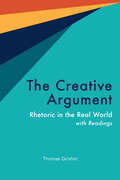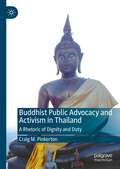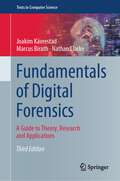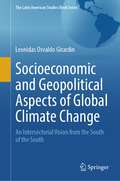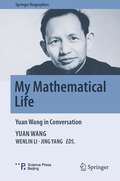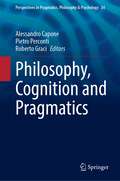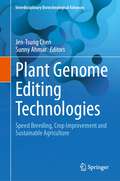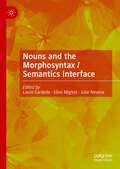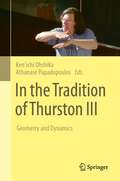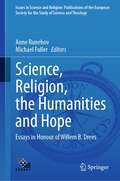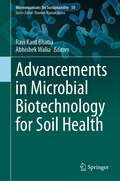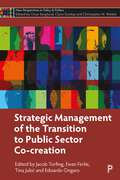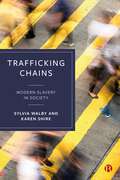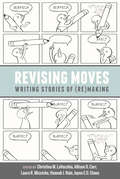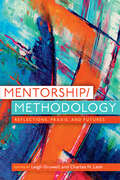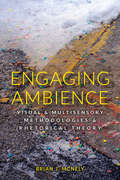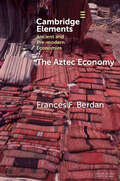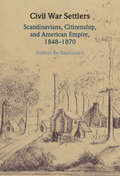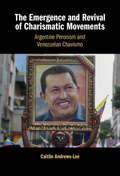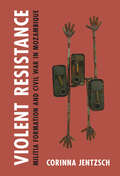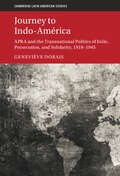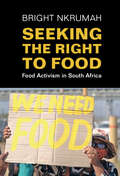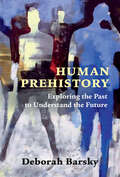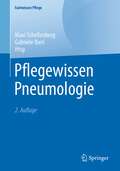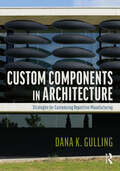- Table View
- List View
The Creative Argument: Rhetoric in the Real World, with Readings
by Thomas GirshinThe Creative Argument sets itself apart from its competitors by presenting a series of compelling works of literary nonfiction that challenge what students think they know about arguments. Each chapter begins with an engaging argument from a work of nonfiction, followed by an in-depth yet accessible analysis of a key aspect of argumentation. Suitable for both courses in argument and first-year writing, the principles and strategies outlined in the text help students become more creative and critical as rhetoricians, both inside the classroom and out.
Buddhist Public Advocacy and Activism in Thailand: A Rhetoric of Dignity and Duty
by Craig M. PinkertonThis book studies Buddhist public advocacy and activism in Thailand—a movement often broadly called socially engaged Buddhism—from the perspective of rhetorical studies, specifically, on humanizing and dehumanizing communication practices. In modern Thailand and historical Siam, Buddhism has been integral to the social change processes shaping civil society and an emerging democracy. This study examined two problems: How do contemporary Buddhists in Thailand use rhetorical practice to influence the way the issues they work on are understood, and how do these Buddhists justify their advocacy and activism in rhetorical practice? To the first, a rhetoric of dignity, or humanization, was the central answer. To the second, a rhetoric of duty was the central answer. For researchers in Southeast Asian Studies, Thai Studies, and Buddhist Studies, this book offers a fresh perspective on socially engaged Buddhism through the lens of the communication discipline. For researchers in Psychologyand Communication, it sheds light on the understudied practices of humanizing communication. The bulk of the current research is focused on its opposite—dehumanization—and most of this literature is in the field of psychology even though humanization and dehumanization are fundamentally and ontologically communication phenomena. For researchers within the field of Communication and Rhetorical Studies, this book advances innovations in the emerging practices of rhetorical field methods by applying rhetorical criticism to interview data in a new way and provides a non-western perspective on communication and rhetorical theory for which there has been continual calls.
Fundamentals of Digital Forensics: A Guide to Theory, Research and Applications (Texts in Computer Science)
by Joakim Kävrestad Marcus Birath Nathan ClarkeThis textbook describes the theory and methodology of digital forensic examinations, presenting examples developed in collaboration with police authorities to ensure relevance to real-world practice. The coverage includes discussions on forensic artifacts and constraints, as well as forensic tools used for law enforcement and in the corporate sector. Emphasis is placed on reinforcing sound forensic thinking, and gaining experience in common tasks through hands-on exercises.This enhanced third edition describes practical digital forensics with open-source tools and includes an outline of current challenges and research directions.Topics and features:Outlines what computer forensics is, and what it can do, as well as what its limitations areDiscusses both the theoretical foundations and the fundamentals of forensic methodologyReviews broad principles that are applicable worldwideExplains how to find and interpret several important artifactsDescribes free and open-source software toolsFeatures content on corporate forensics, ethics, SQLite databases, triage, and memory analysisIncludes new supporting video lectures on YouTubeThis easy-to-follow primer is an essential resource for students of computer forensics, and will also serve as a valuable reference for practitioners seeking instruction on performing forensic examinations.
Socioeconomic and Geopolitical Aspects of Global Climate Change: An Intersectorial Vision from the South of the South (The Latin American Studies Book Series)
by Leonidas Osvaldo GirardinThis book discusses climate change from an academic point of view centered on and from Latin America. Although climate change is a global issue, there has been a notable lack of input from the Latin American perspective, which means that many Latin American intellectuals often bring ideas, tools and potential solutions proposed by external, international research centers or organizations to the region. This book embraces a Latin American viewpoint to critically engage the problem and many of the concepts used in the analysis of climate change.The text emphasizes heterogeneity as an essential factor that cannot be absent in the analysis of how to understand and face the challenges posed by climate change. This heterogeneity refers not only to the magnitude of the impact that different regions will experience (including in their productive activities, ecosystems and social groups), but also to their contexts and capacities. Different countries' and regions' historical accumulated emissions—the primary cause of the current atmospheric concentrations of greenhouse gases—can inform current responsibilities, and their diverse productive structures will also contribute to different baselines in energy, agriculture and other sectors. Asymmetries in economic, technological and political capacities to face climate-related challenges will influence the social and economic costs of potential adaptation and mitigation measures.Using this conceptual approach, the book focuses on some of the main climate change-linked impacts expected in the region, such as effects on semi-arid ecosystems, and feasible, sector-specific adaptation measures. Furthermore, it contextualizes mitigation measures that appear on the international agenda (including the utilization of economic instruments to flexibilize the fulfillment of climate commitments) in the Latin American region.Socioeconomic and Geopolitical Aspects of Global Climate Change: An Intersectorial Vision from the South of the South offers socioeconomic and geopolitical analysis from the perspective of a region that is going to suffer impacts disproportionately greater than its historical and current responsibility in triggering this global environmental threat.
My Mathematical Life: Yuan Wang in Conversation (Springer Biographies)
by Yuan WangThis book is an autobiographical interview with Chinese Academician Yuan Wang on his experience in mathematical research. The book looks back on Wang's collaboration with his teacher Hua Loo-Keng and younger scholars, offering insights into fruitful cooperation in mathematical research.In this book, Yuan Wang’s path of studying Goldbach conjecture is revealed in detail from motivation to method. Then his work on algebraic number theory is traced back in a separate chapter. The book ends with two chapters which introduce Wang’s interest in history of mathematics and his hobbies outside of mathematical research. Wang shows how a mathematician can in the same time be a historical and popular science writer and, in particular, a well-received calligrapher. The book is intended for undergraduate and graduate students studying number theory. Researchers who are willing to learn from the experience of an established mathematician, as well as math amateurs and general audience who are interested in Yuan Wang's life story might also find this book appealing.
Philosophy, Cognition and Pragmatics (Perspectives in Pragmatics, Philosophy & Psychology #34)
by Alessandro Capone Pietro Perconti Roberto GraciThis book contains essential contributions to enrich and broaden the application field of pragmatics. It provides an example of how the fruitful reflections and refined conceptual distinctions born in the philosophical field can find a practical application in addressing social, cognitive, clinical, and psychological problems. Its chapters address, from different points of view, the relationship between pragmatic linguistics and philosophy, and outline the possible application of pragmatic theories to different domains. Developed during the third Pragmasophia international conference, whose name is derived from the Greek terms πρᾶγμα (action, fact) and σοϕία (knowledge, science), the book aligns itself with its aim to study human actions and activities and how they take shape through language. But ‘Pragma’ and ‘Sophia’ also signal another purpose: highlighting the importance of creating links between empirical investigations on language use, and more traditional philosophical approaches. In this reading, ‘Pragma’ represents the experimental goal devoted to analysing and interpreting language facts. In contrast, the term ‘Sophia’ recalls the original vocation of past philosophers to pursue an ideal of ‘pure knowledge’, disconnected from any practical-economic interest. While maintaining the conference's original purpose of encouraging productive comparisons between different approaches, the book consists of two sections: first, on philosophical approaches, recalls more theoretical aspects (closer to the term ‘Sophia’); the second, ‘Inferential and Cognitive Pragmatics,’ addresses more practical issues affecting domains such as Greek literature, pragmatic disorders, dictionary entries, and speech analysis. The reader, whether in linguists, philosophy or psychology, obtains a complete overview of the most advanced current research lines, both theoretical and empirical, and thus contributes to broadening the scope of pragmatics.
Plant Genome Editing Technologies: Speed Breeding, Crop Improvement and Sustainable Agriculture (Interdisciplinary Biotechnological Advances)
by Jen-Tsung Chen Sunny AhmarThis book reviews all important aspects of plant genome editing to shed new light on these genome editing technologies together in crop improvement and sustainable agriculture. The book is divided into three areas: the first of which reinterprets plant genome studies from an overview perspective, examining the safety and risk assessment of plants as well as breeding-related outcomes. The second area discusses recent advances in the understanding of crop improvement. A wide range of plant stress tolerance in relation to plant genome editing is then addressed, before turning attention to specific species approaches including rice, maize, wheat, and soybean. The entire book is devoted to an updated knowledge of plant genome editing technologies from all aspects of plant biology and agronomy as we move toward advancements in sustainable life research. The book will be highly recommended for agriculture biologists, agronomists, plant pathologists, and all related research areas.
Nouns and the Morphosyntax / Semantics Interface
by Laure Gardelle Elise Mignot Julie NeveuxThis edited book seeks to bridge a gap in the existing literature on nouns, by exploring the exact relationship between their formal and semantic characteristics. The introductory chapter offers a thorough state of the art on the morphosyntactic and semantic angles in definitions of nouns, provides evidence of misalignments between morphosyntactic and semantic features, and argues that a multi-criterial angle is in fact inherent in the definition of the class of nouns. The following chapters bring together a representative cross-section of international-level research on the morphosyntax/semantics interface for nouns, covering a wide variety of languages from French-based creoles, German and Japanese to English, French, Italian, Russian and Uzbek. The focus of the volume is to take a special focus on the currently underestimated dynamic interplay between morphosyntax and semantics, at both language and discourse levels. It will be of interest primarily to academics (specialists of nouns, as well as anyone interested in the interplay between morphology, syntax and semantics) and graduate students in areas such as syntax, semantics, morphology, theoretical linguistics and discourse analysis.
In the Tradition of Thurston III: Geometry and Dynamics
by Ken’ichi Ohshika Athanase PapadopoulosWilliam Thurston’s ideas have altered the course of twentieth century mathematics, and they continue to have a significant influence on succeeding generations of mathematicians. The purpose of the present volume and of the other volumes in the same series is to provide a collection of articles that allows the reader to learn the important aspects of Thurston’s heritage. The topics covered in this volume include Kleinian groups, holomorphic motions, earthquakes from the Anti-de Sitter point of view, the Thurston and Weil–Petersson metrics on Teichmüller space, 3-manifolds, geometric structures, dynamics on surfaces, homeomorphism groups of 2-manifolds and the theory of orbifolds.
Science, Religion, the Humanities and Hope: Essays in Honour of Willem B. Drees (Issues in Science and Religion: Publications of the European Society for the Study of Science and Theology #8)
by Anne Runehov Michael FullerThis book collects a multidisciplinary range of contributions focusing on the prolific and seminal work of Willem Drees in the fields of philosophy of religion, philosophy of the humanities, and science and theology/religion. Trained in both theoretical physics and theology/philosophy of religion, Drees holds doctoral degrees in both theology and in philosophy and, amongst other distinguished positions, held professorships at the University of Leiden and at the University of Tilburg. Drees was also Editor-in-Chief of Zygon, Journal of Religion & Science, between 2008 and 2018, and served as President of the European Society for the Study of Science and Theology (ESSSAT) between 2002 and 2008. In 2018, he was elected as member of the Royal Holland Society of Sciences and Humanities (KHMW). This contributed volume builds on Drees’ expansive and provocative scholarly contributions, notably around the concept and meaning of naturalism and the humanities to the fields of science and religion, as exemplified by his works Religion, Science and Naturalism (1996) and What Are the Humanities For? (2021). In a time where more and more young people across the globe are entering higher education such cross-disciplinary explorations and (re-)evaluations are vital to the field. Accordingly, by approaching his work from a variety of disciplines this collection illuminates the broad reach of Drees’ work and provides scholars from various fields with many new and rich opportunities avenues for research.
Advancements in Microbial Biotechnology for Soil Health (Microorganisms for Sustainability #50)
by Ravi Kant Bhatia Abhishek WaliaThis edited book covers the latest trends to improve soil health. It provides an easy-to-understand information to the readers. This book acts as a reference book for various agronomists and research scholars working in the field of agriculture. This edited book covers advanced technologies and practices carried out worldwide to improve soil health. In the present scenario, it is very important to save soil health and replenish it in a sustainable manner from various anthropogenic hazards. As soil is the source to almost all lives on earth and it is duty, the scientific community is developing ways to disseminate and communicate the most recent advancements to restore its health. Content of the book is designed in such a way that it provides a compressive information to the readers to restore the soil health that will ultimately help to improve the health of microbes, animals as well as plants that thrive in the soil and ultimately the quality of life of human being. This book helpsresearch scholars and teachers working in agriculture, horticulture, and environmental management by utilizing advances in microbiology and biotechnology. It is of interest to undergraduate and graduate students, teachers, researchers, environmentalists, agriculture and horticulture scientists, capacity builders, policy makers and all other stakeholders.
Strategic Management of the Transition to Public Sector Co-Creation
by Jacob Torfing, Ewan Ferlie, Tina Jukić and Edoardo OngaroAs the practices of public governance are rapidly changing, so must the theoretical frameworks for understanding the creation of efficient, effective and democratic governance solutions. First published as a special issue of Policy & Politics journal, this book explores the role of strategic management, digitalisation and generative platforms in encouraging the co-creation of innovative public value outcomes. It considers why we must transform the public sector to drive co-creation and the importance of integrating different theoretical strands when studying processes, barriers and outcomes. This book lays out important stepping-stones for the development of new research into the ongoing transition to co-creation as a mode of governance.
Trafficking Chains: Modern Slavery in Society
by Sylvia Walby Karen ShireAvailable open access digitally under CC-BY-NC-ND license. This book offers a theory of trafficking and modern slavery with implications for policy. Despite economic development, modern slavery persists all around the world. The issue is not only one of crime but the regulation of the economy, better welfare, and social protections. Going beyond polarized debates on the sex trade, an original empirical analysis shows the importance of profit-taking. Although individual experience matters, the root causes lie in intersecting regimes of inequality of gender regimes, capitalism, and the legacies of colonialism. This book shows the importance of coercion and the societal complexities that perpetuate modern slavery.
Revising Moves: Writing Stories of (Re)Making
by Christina M. LaVecchia Allison D. Carr Laura R. Micciche Hannah J. Rule Jayne E. O. StoneRevision sometimes seems more metaphor than real, having been variously described as a stage, an act of goal setting, a method of correction, a process of discovery, a form of resistance. Revising Moves makes a significant contribution to writing theory by collecting stories of revision that honor revision’s vitality and immerse readers in rooms, life circumstances, and scenes where revision comes to life. In these narrative-driven essays written by a wide range of writing professionals, Revising Moves describes revision as a messy, generative, and often collaborative act. These meditations reveal how revision is both a micro practice tracked by textual change and a macro phenomenon rooted in family life, institutional culture, identity commitments, and political and social upheaval. Contributors depict revision as a holistic undertaking and a radically contextualized, distributed practice that showcases its relationality to everything else. Authors share their revision processes when creating scholarly works, institutional and self-promoting documents, and creative projects. Through narrative the volume opens a window to what is often unseen in a finished text: months or years of work, life events that disrupt or alter writing plans, multiple draft changes, questions about writerly identity and positionality, layers of (sometimes contradictory) feedback, and much more.
Mentorship/Methodology: Reflections, Praxis, and Futures
by Leigh Gruwell Charles N. LeshMentorship/Methodology brings together emerging and established scholars to consider the relationship between mentoring practices and research methodologies in writing studies and related fields. Each essay in this edited collection produces a new intellectual space from which to theorize the dynamics of combining mentoring and research in institutions and communities of higher education. The contributors consider how methodology informs mentorship, how mentorship activates methodology, and how to locate the future of the field in these moments of intersection. Mentorship, through the research and relationships it nourishes, creates the future of writing studies—or, conversely, reproduces the past. At the juncture where this happens, the contributors inquire, Where have current arrangements of mentorship/methodology taken writing studies? Where do these points of intersection exist in performance and practice, in theory, in research? What images of the field do they produce? How can scholars better articulate and write about these moments or spaces in which mentorship and methodology collide in productive disciplinary work? By making the “slash” more visible, Mentorship/Methodology provides significant opportunities to support and cultivate diverse ways of knowing and being in rhetoric and composition, both locally and globally. The volume will appeal to students and scholars of rhetoric, composition, and technical and professional communication, as well as readers interested in conversations about mentorship and methodology.
Engaging Ambience: Visual and Multisensory Methodologies and Rhetorical Theory
by Brian McNelyEngaging Ambience is an in-depth exploration of contemporary rhetorical theory, drawing from rich traditions of visual and sensory research. It is the first book to develop comprehensive empirical approaches to ambient rhetoric and the first to offer systematic approaches to visual research in studies of rhetoric and writing. These approaches address the complexities of everyday life and offer practical advice for understanding the factors that shape individuals and communities, how they understand one another, and the kind of world they envision. By articulating theoretically sound methodologies and methods for the empirical study of rhetoric conceived as originary, immanent, and enveloping, Brian McNely contributes a methodological perspective that furthers new materialist theories of rhetoric. McNely demonstrates how scholars’ emergent theories of rhetoric call for new methodologies that can extend their reach, and in the process, he proposes a new conception of visual rhetoric. Engaging Ambience delineates methodologies and methods that help researchers in rhetoric and writing studies discover the ambient environments that condition and support everyday communication in all its forms. Engaging Ambiencedetails and demonstrates visual and multisensory methodologies and methods for exploring the wondrous complexity of everyday communication. It will appeal to scholars and students of rhetorical theory, visual and multisensory rhetorics, and composition and writing studies.
The Aztec Economy (Elements in Ancient and Pre-modern Economies)
by Frances F. BerdanThe Aztec Economy provides a synthesis and updated examination of the Aztec economy (1325–1521 AD). It is organized around seven components that recur with other Elements in this series: historic and geographic background, domestic economy, institutional economy, specialization, forms of distribution and commercialization, economic development, and future directions. The Aztec world was complex, hierarchical, and multifaceted, and was in a constant state of demographic growth, recoveries from natural disasters, political alignments and realignments, and aggressive military engagements. The economy was likewise complex and dynamic, and characterized by intensive agriculture, exploitation of non-agricultural resources, utilitarian and luxury manufacturing, wide-scale specialization, merchants, markets, commodity monies, and tribute systems.
Civil War Settlers: Scandinavians, Citizenship, and American Empire, 1848–1870
by Anders Bo RasmussenCivil War Settlers is the first comprehensive analysis of Scandinavian Americans and their participation in the US Civil War. Based on thousands of sources in multiple languages, that have to date been inaccessible to most US historians, Anders Bo Rasmussen brings the untold story of Scandinavian American immigrants to life by focusing on their lived community experience and positioning it within the larger context of western settler colonialism. Associating American citizenship with liberty and equality, Scandinavian immigrants openly opposed slavery and were among the most enthusiastic foreign-born supporters of the early Republican Party. However, the malleable concept of citizenship was used by immigrants to resist draft service, and support a white man's republic through territorial expansion on American Indian land and into the Caribbean. Consequently, Scandinavian immigrants after emancipation proved to be reactionary Republicans, not abolitionists. This unique approach to the Civil War sheds new light on how whiteness and access to territory formed an integral part of American immigration history.
The Emergence and Revival of Charismatic Movements: Argentine Peronism and Venezuelan Chavismo
by Caitlin Andrews-LeePolitical movements founded by charismatic leaders are often considered ephemeral. Existing literature argues that because they rest on unmediated, emotional attachments between leaders and followers, these movements either fade quickly after their leaders disappear or transform into routinized parties. Yet, charismatic movements around the world have proven surprisingly resilient and have retained their personalistic core. Focusing on Argentine Peronism and Venezuelan Chavismo, this book investigates the nature and trajectory of charismatic movements from the perspectives of both leaders and followers. Using interviews, focus groups, and survey experiments, Caitlin Andrews-Lee reveals that charismatic movements can emerge, survive, and become politically revived by sustaining - not discarding - their personalistic character. Followers' charismatic attachments to the movement founder can develop into an enduring, deeply affective political identity that successors can reactivate under certain conditions by portraying themselves as symbolic reincarnations of the founder. Consequently, charismatic movements can have lasting, deleterious effects on democracy.
Violent Resistance: Militia Formation and Civil War in Mozambique (Cambridge Studies in Contentious Politics)
by Corinna JentzschWhy do communities form militias to defend themselves against violence during civil war? Using original interviews with former combatants and civilians and archival material from extensive fieldwork in Mozambique, Corinna Jentzsch's Violent Resistance explains the timing, location and process through which communities form militias. Jentzsch shows that local military stalemates characterized by ongoing violence allow civilians to form militias that fight alongside the government against rebels. Militias spread only to communities in which elites are relatively unified, preventing elites from coopting militias for private gains. Crucially, militias that build on preexisting social conventions are able to resonate with the people and empower them to regain agency over their lives. Jentzsch's innovative study brings conceptual clarity to the militia phenomenon and helps us understand how wartime civilian agency, violent resistance, and the rise of third actors beyond governments and rebels affect the dynamics of civil war, on the African continent and beyond.
Journey to Indo-América: APRA and the Transnational Politics of Exile, Persecution, and Solidarity, 1918–1945 (Cambridge Latin American Studies #123)
by Geneviève DoraisThe American Popular Revolutionary Alliance (APRA) was a Peruvian political party that played an important role in the development of the Latin American left during the first half of the 1900s. In Journey to Indo-América, GenevieÌve Dorais examines how and why the anti-imperialist project of APRA took root outside of Peru as well as how APRA's struggle for political survival in Peru shaped its transnational consciousness. Dorais convincingly argues that APRA's history can only be understood properly within this transnational framework, and through the collective efforts of transnational organization rather than through an exclusive emphasis on political figures like APRA leader, Víctor Raúl Haya de la Torre. Tracing circuits of exile and solidarity through Latin America, the United States, and Europe, Dorais seeks to deepen our appreciation of APRA's ideological production through an exploration of the political context in which its project of hemispheric unity emerged.
Seeking the Right to Food: Food Activism in South Africa
by Bright NkrumahDespite a constitutional right to food, a comprehensive social security structure, being a net exporter of agricultural products and maintaining a rising GDP, freedom from hunger remains a pipedream for millions of South Africans. With a constant surge in food prices, the availability of sustenance is often seriously threatened for all of South Africa's population. While the underprivileged majority residing in townships often demonstrate their discontent for poor service delivery on the streets, they rarely channel this strategy into taming food inflation. This study seeks to understand this irony and examine ways in which this trend could be reversed. Proposing a compelling argument for food activism, Bright Nkrumah suggests ways of mobilising disempowered groups to reclaim this inherent right. Presented alongside historical and contemporary case studies to illustrate the dynamics of collective action and food security in South Africa, he draws from legal, social and political theory to make the case for 'activism' as a force for alleviating food insecurity.
Human Prehistory: Exploring the Past to Understand the Future
by Deborah BarskyThis book provides a concise overview of human prehistory. It shows how an understanding of the distant past offers new perspectives on present-day challenges facing our species - and how we can build a sustainable future for all life on planet Earth. Deborah Barsky tells a fascinating story of the long-term evolution of human culture and provides up-to-date examples from the archaeological record to illustrate the different phases of human history. Barsky also presents a refreshing and original analysis about issues plaguing modern globalized society, such as racism, institutionalized religion, the digital revolution, human migrations, terrorism, and war. Written in an accessible and engaging style, Human Prehistory is aimed at an introductory-level audience. Students will acquire a comprehensive understanding of the interdisciplinary, scientific study of human prehistory, as well as the theoretical interpretations of human evolutionary processes that are used in contemporary archaeological practice. Definitions, tables, and illustrations accompany the text.
Pflegewissen Pneumologie (Fachwissen Pflege)
by Mavi Schellenberg Gabriele IberlPneumologie im Wandel – Pflege auf dem neusten Stand!Dieses Buch bietet Pflegenden auf pneumologischen Stationen und Einrichtungen spezielles Fachwissen für die kompetente und umfassende Versorgung ihrer Patienten.Die Durchführung von allgemeinen und speziellen Pflegemaßnahmen bei der Betreuung von Menschen mit akuten und chronischen Atemwegserkrankungen erfordert besondere fachliche und psychosoziale Fähigkeiten. Besonders in der Pandemie wurde dies nochmal deutlich. Lernen Sie anhand konkreter Fallbeispiele, wie Sie theoretische Grundlagen in der Praxis effektiv umsetzen können. Das interdisziplinäre Autorenteam macht deutlich, dass die pflegerischen Aufgaben bei der Behandlung einen wesentlichen Teil einnehmen und das Outcome der Patienten positiv beeinflussen.
Custom Components in Architecture: Strategies for Customizing Repetitive Manufacturing
by Dana GullingThis book offers architects strategies in the design and manufacturing of custom, repetitively manufactured building components.A total of 36 case studies from around the globe demonstrate the diversity of CRM in architecture and are contributed by architecture firms, including Diller Scofidio + Renfro, Kengo Kuma & Associates, Abin Design Studio, Behnisch Architekten, Belzberg Architects, and many more. The book is organized by manufacturing process and covers the use of various types of glass, clay, plastic, metal, wood, plaster, and concrete. Each process is described with diagrams and text and expanded with one or more examples of customized building components. Projects included are of buildings of various types, sizes, and clients, and many deviate from the typical manufacturing process as they include a secondary process (e.g. casting glass, then slumping it), special tooling modifications (e.g. dams used to subdivide a mold), post-production processes, or other notable manufacturing features. Each case study includes a project overview, behind‐the‐scenes images of the component manufacturing, and original diagrams that illustrate how those components were customized.Custom Components in Architecture will be essential reading for any architect interested in building design details and keeping up-to-speed on material advances. Upper-level students of digital architecture, fabrication, and building technology will also find this a useful tool.
